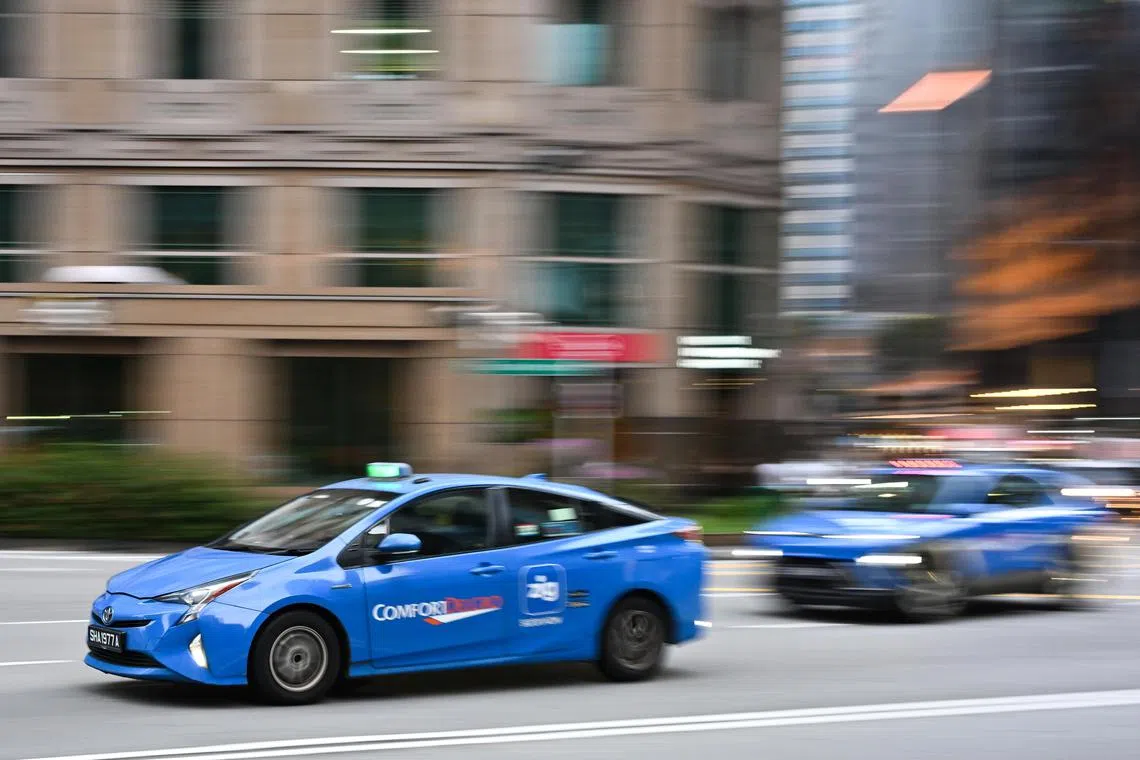New Singapore campaign targets fare evasion on taxis and private-hire cars
Sign up now: Get ST's newsletters delivered to your inbox

A total of 92 cases of fare evasion involving taxis and private-hire vehicles were referred to the authorities for investigation in 2024.
ST PHOTO: LIM YAOHUI
Follow topic:
SINGAPORE – A campaign to tackle the problem of passengers evading fares on taxis and private-hire vehicles has been launched, although the number of cases referred to the authorities for investigation dropped by half in 2024 following an upward trend in recent years.
A total of 92 cases of fare evasion involving taxis and private-hire vehicles were referred to the authorities for investigation in 2024, according to figures released to The Straits Times by the Land Transport Authority (LTA) and the Public Transport Council (PTC) in February.
This was nearly half of the 198 cases investigated by the authorities in 2023. There were 170 cases in 2022
Of the 92 cases in 2024, several were committed by five offenders who were involved in multiple instances of fare evasion. This was an increase from three repeat offenders each in 2023 and 2022, and four in 2021.
Launched on Feb 10, the campaign – Ride Clean, Pay the Fare – aims to promote good etiquette and mutual respect between passengers and drivers, said LTA and PTC.
Besides encouraging passengers to pay their fares, the campaign also nudges them to keep the cars they book clean.
More than 3,400 car decals promoting the campaign have been distributed so far. Apart from getting drivers to display these decals in taxis and private-hire cars, LTA and PTC said the campaign will also feature short video reels to encourage gracious behaviour on rides.
Fare evasion typically occurs when passengers are expected to pay for their taxi or private-hire vehicle rides using cash.
Long-time taxi driver Ben Tan, 44, feels that fare evasion is becoming more rampant, based on his personal experience and anecdotes from his taxi driver friends.
Recounting past incidents, he said fare evaders would typically not carry cash with them and ask to pay via cashless methods such as PayNow. They would then claim the banking apps are undergoing maintenance and request to pay him the next morning once the payment services are restored.
Mr Tan said: “I just let them go (without receiving payment). What can I do? Follow them up to their house to take money?
“This is about willingness and trust. If I don’t let the passengers go and keep them (in my taxi), and ask their parents to bring the money down, then it’s not nice, right?”
On why he does not report these cases to the ride-hailing operators, Mr Tan said the platforms would request drivers to make a police report, which could take up around two hours of his time.
“Is it worth it (to lose) two hours? Is it worth the time and effort, if the fare is $20, to make a police report?” he added.
Having encountered similar fare evasion cases, Ms Carmen Ortega, a 38-year-old private-hire car driver of 10 years, said she would ask passengers who choose to pay by cash to do so, or transfer the money to her via PayNow, at the start of the trip.
Ms Ortega said she has become more selective and prioritises trips where passengers pay by card instead of cash.
“During dodgy hours, I try not to pick up (passengers paying by cash). I am quite picky,” she added.
The majority of rides booked by passengers on ride-hailing platforms here are paid for by card or other cashless methods.
Taxi operator ComfortDelGro said it received an average of 1,700 fare evasion reports a year from 2021 to 2024. For such cases, ComfortDelGro advises cabbies to file police reports, and it will compensate drivers for the fares before seeking reimbursement from the passengers.
Ride-hailing platform Gojek said non-payment of fares is “an extremely rare occurrence” and usually caused by human error.
Ride-hailing operator Tada also said it received a “relatively low number” of fare evasion cases from 2021 to 2024. It advises affected drivers to file police reports if passengers are not cooperative, as it will pay them back once the police report is lodged.
Ride-hailing platform Grab requests its drivers to report fare evasion incidents immediately. Upon verification of the incidents, Grab said it will reimburse drivers for the fares within three working days.
Both Tada and Grab noted that they may ban errant passengers from their platforms if they continue to evade payment.
PTC works with LTA to investigate fare evasion on trips operated by licensed taxi and ride-hailing operators.
To facilitate investigation, the driver should try to retain trip details, including the pickup and drop-off points, as well as other information such as the passenger’s name, identity number and phone number, to report the case to the operators, said PTC and LTA.
If operators are unable to get the fare back from the passenger, they can refer the case to LTA for further investigation, said the authorities. Alternatively, the driver can call the police for help, or drive the passenger to the nearest police station, said PTC and LTA. The driver can then refer the case to LTA for investigation after lodging a police report.
If the investigation shows the passenger has committed an offence of evading fares under Section 56 of the PTC Act, the council will work with LTA to take legal action against the offender.
Offenders will need to pay a composition sum of $200 for the first offence and $400 for the second offence, on top of the street-hailing or ride-hailing fare to be reimbursed to the driver.
Those who do not pay the composition sum, repeat offenders who evade fare payment three or more times, or those who do not return the evaded fare, will be charged in court.
Another issue that taxi and private-hire car drivers may face is passengers dirtying their vehicles.
ComfortDelGro noted that from 2021 to 2024, its cabbies submitted an average of 19 to 38 claims each year for vehicle-cleaning costs due to incidents of passengers vomiting.
Grab, like many platforms, also reimburses drivers for vehicle-soiling cases once it receives photo evidence and cleaning receipts.
It added that beyond the cleaning fees, such incidents could significantly impact its drivers’ livelihoods as cleaning a soiled vehicle can take a few hours – which drivers could better spend on earning money from trips.
While most platforms compensate drivers for the cost of cleaning soiled vehicles, Ms Ortega said it is “not worth it” as she is not reimbursed for the time spent sending her car to a workshop and the income lost during that period.
“If I see a passenger lying on the floor (drunk), I will cancel the trip. I don’t want to put myself in that situation. And if it’s cash payment, it’s worse because we’ll argue... So I might as well cancel the ride,” she added.


